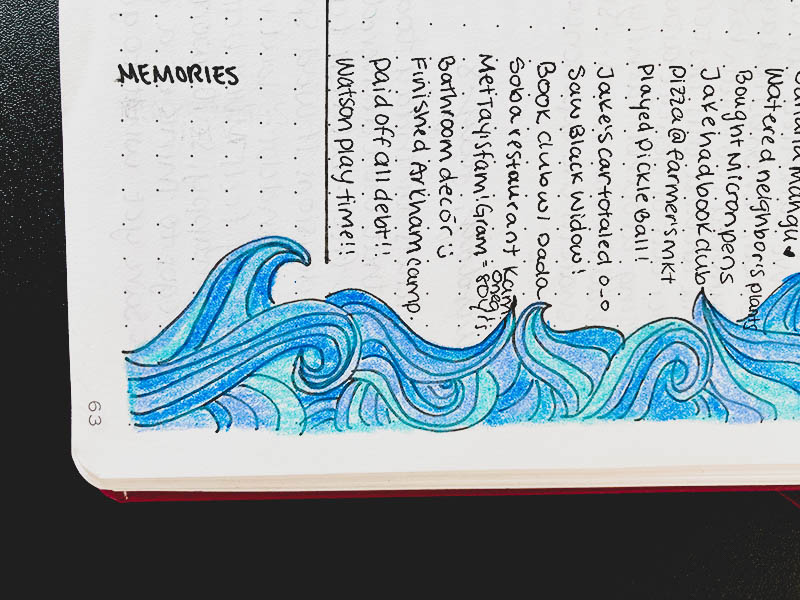Time is slippery and recedes rapidly when we’re not paying attention, creating pockets of remorse where there should be joy. Our days are filled with beautiful moments, even among the piles of responsibilities, yet we do not remember them. All around us, the mainstream media is yelling at us:
SLOW DOWN!
PRACTICE MINDFULNESS!
WHY AREN’T YOU MEDITATING?!
It’s an attempt to fill the void, but is it working? Are we feeling more joyful, or just feeling more like the list of things we “should” be doing is growing?
Meditation and mindfulness have their place, but they often don’t address what we really desire: more time. If you desire a life filled with memories beyond the few big benchmarks, you’ll want to start jotting down the little things that stand out among each day. By writing down one takeaway from each day, you’ll notice the lines between days, weeks, months, and years start to become a little less hazy, and life will feel fuller.
We can’t create more time, but we can influence our perception of time. I’ll share with you the “one memory per day” method along with the philosophy backing it up so you can start cultivating more joy in your life as well.
Reality vs. Perception of Time
Since many people way smarter than I have done extensive research and documentation around the science of memory and the theory of time, I won’t go down that rabbit hole. Instead, I’d like to take a moment to level with you about the reality that we all experience: time keeps chugging along, with or without our consent.
Although we all experience time linearly, we don’t necessarily perceive time in the same way. To provide an example, imagine yourself sitting in the back of a lecture hall listening to a presentation about world economics. You’ve been in the room for 2 hours and you’re about halfway through. Are you looking at your watch impatiently, scheming a way to slip out of the room unnoticed? Or are you hunched over your notebook, wishing you could write faster to soak in all the knowledge?
In this example, the first reaction represents someone who perceives the time as slowly dragging on, while the second reaction represents someone who perceives the time flying by. While the same amount of time has elapsed for both people, their perception will shape their reality both in the moment and in their memory when they look back on it.
Since this is true, it’s not far-fetched to imagine that we can influence our perception of reality – a close second to being able to influence time itself.
Assess Your Memories: What’s Important to You?
If you take a moment to think back on your life, what are the moments that stand out to you?
I’m guessing you can easily recall moments of your childhood when you were experiencing something new or during a time of intense emotions. You probably recall important milestones in your life, like your wedding day, your first big solo trip, the day you bought a new car or the day you became a parent. If you keep thinking, you probably start recalling the moments associated with old family photographs you fondly look back on, moments you reflect on often with friends, embarrassing mishaps you’d rather forget, or things you accomplished that you’re especially proud of.
Whether I was right or wrong in that assessment above, one thing is for certain: we don’t remember every detail of our lives, just moments.
The ones that stand out tend to be the ones associated with newness, as Jude King points out in his 2019 article “The Magic of First Moments: How to Slow Down Time And Create Rich, Lasting Memories.”
“Scientists found that the human brain transcribes novel experiences better than mundane ones. For instance, a 1988 study found that 93% of vivid life memories concern unique or first-time events.”
Jude King, PhD, september 17, 2019
We also tend to remember more things from our early years. This is beautifully captured in the words of Marina Fleider in her 2021 article titled, “How to Slow Down Time.”
“Another explanation is one pertaining to mindfulness and the fact that we are more present when we are younger, less distracted by thoughts of the past or the future, by the people relying on us, and other responsibilities of adult life. As we grow older, competing responsibilities make it more difficult to focus on any one specific task, essentially rendering us less mindful of the present situation. As such, the passage of time is less memorable to our brains and therefore appears to speed by faster.”
Marina Fleider, May 1, 2021
Two things become clear at this point:
- Our minds seem to go into autopilot mode when we reach adulthood, preferring to categorize familiar things into buckets instead of continuously creating novel experiences
- If we try, we should conceivably be able to pull away from full autopilot and start cataloguing more memories as a result
Side note: The fear of the passage of time is a real thing; it’s called chronophobia. I made this discovery while playing Arkham Horror LCG and pulling a random basic weakness called Chronophobia. It was then that my fears felt validated, by Arkham Horror, of all things. Anyone else here blown away by this? No? Just me? On another note, any Arkham Horror fans?
The Search for More Time

Each generation faces its unique challenges, yet the regrets of the dying tend to have one thing in common: not making the most of every moment. My therapist recently reminded me that no matter how much time we have, there’s never enough of it. If we know that one day we’ll reflect on our lives and ask ourselves if it was all worth it, then it stands to reason that the only thing we regret most of all is the lack of trying.
In his 2013 Ted Talk called “The power of rest and reflection,” Daniel Rubin states: “Our generation loves life – we’re constantly trying to figure out how to live longer.”
That hits home so accurately that it hurts.
We love life so much that we’ll do anything to try and make the most of it. Unfortunately, mainstream media has convinced many of us that we need to “hack” our way to a better life. Meditation, mindfulness, and being in the present have all been adapted and altered from their original forms to suit our go-go-go lifestyle. They promise radical change and transformation, and if they don’t deliver, people get discouraged and write them off as “just another fad.”
The thing is, that practiced correctly, those methods really can be life changing, but they are not quick fixes.
As someone who dabbles in meditation, has struggled with being in the present, and is trying really hard to practice mindfulness, I know firsthand that it takes a lot of work to re-wire your mind and form new habits. A LOT of work.
Aside from what the mainstream media tries to sell as the solution, another strategy to love and enjoy the shit out of life is to simply focus on the parts that matter most.
What We Focus on Becomes Our Reality
When we don’t have anchor points in our lives, the weeks, months, even years start to blur. Years from now, everyone who lived through 2020 will be able to recall a year’s worth of events related to the pandemic. I bet you could readily talk about what happened in March 2020, but you wouldn’t be able to easily recall a story from March 2009.
Anchor points slow time down.
There are many ways to create anchor points throughout our lives. Photos are one way – as you look through your photo albums, your mind conjures memories associates with the visual cues. Journals are another way – as you read through your entries, you remember how you were feeling and what was going on in that time of your life.
Jotting down one memory per day is another way. Instead of relying on circumstantial photos (which usually happen around big events or social gatherings) and instead of having a big commitment to writing (which usually holds people back from keeping a journal), capturing one memory per day is simple, rewarding, and surprisingly effective.
Remembering One Memory a Day Doubles Your Life

Here’s the concept: at the end of every day, jot down three or four words about something memorable that happened that day.
The idea is that by thinking of a memorable event, you are re-living key events from your day. Since they are still fresh in your mind, you have a high likelihood of remembering small details. By doing so, you transfer the day’s events from your subconscious mind to your conscious mind, indicating to your brain that they are important enough to store for later.
Let’s face it – it’s your life we’re talking about here and it’s important enough to store in your conscious mind.
If your mind perceives even dull moments as cool experiences, you’ll create many more anchor points in your memory. You’ll notice that monotonous days become filled with more joy as you pick out unique and interesting things to focus on. Individual days gain more meaning when they are special in their own way, aside from just contributing to the bigger picture.
How to Start a Memory Log
Don’t overcomplicate or overthink it. I only give myself a few inches of space on one line and I try to write down something simple before I go to bed, like:
“Started new Arkham Campaign.” “Went whitewater rafting!” “Talked with Alex on the phone ♥” “Got first harvest from garden.”
Here are a few simple steps you can follow to start:
- Pick a designated space for capturing your memories. This could be a journal, a piece of paper, a whiteboard, an Excel spreadsheet, your phone – whatever works for you.
- Decide when you’re going to write. I like taking a moment before bed to pick a memory to write down, but you can choose any time in the day. The important part is to write something while the day is still fresh in your mind.
- Get a rhythm going. Pick a week where you know you’ll be able to consistently write something down each day to start out. One you start, it’s easier to keep going.
- Don’t worry about perfection. If it looks messy, if you miss a few days, if you write down something silly, don’t worry! It doesn’t really matter how it looks, what matters is that you’re remembering your life.
Try to get into a neutral headspace so that you don’t end up judging yourself around what you “should have” or “could have” done in the day. For the purposes of your one daily memory, try to objectively note down something that happened as an observer of your life. There are already too many opportunities in the day to judge ourselves harshly, don’t let this be one of them.
If you keep a journal, I’d recommend creating a separate section for your daily memories. It’s great to write in length and capture elaborate thoughts, but there’s something nice about simplifying it down to just a few words.
Life is Awesome – Don’t Forget it! (TL;DR)
The beauty behind jotting down a quick daily memory is that you’ll start to look at your days differently. It all begins with focusing on what is important to you and then encouraging your brain to bring memories from your subconscious mind to your conscious mind.
If it sounds like magic, it basically is. All of life is a sort of magic, really, we just seem to forget it as we get older, and things start to become more familiar. I would like to encourage you to hold on to that feeling of magic and newness, even in the boring or mundane moments.
You’ll be surprised how much you remember about your life once you start writing down a memory from each day. All you need to do is pick a place to write, decide when you’ll write, and start jotting down notes. If you think you’ve got a boring life with nothing exciting going on, you’ll start to realize just how much there is around you to focus on, appreciate, and make magical just by looking at it differently.





